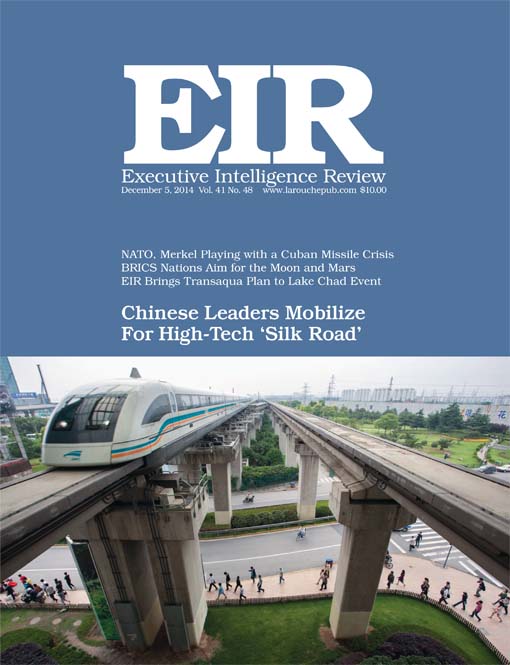|
.
|
|
|
|
China's New Silk Road:
Changing the Paradigm Toward Global Development
by William C. Jones and Michael Billington
On September 7, 2013, the world changed. On that day, Chinese President Xi Jinping, speaking at Nazarbayev University in Astana, Kazakhstan, called for the development of a Silk Road Economic Belt (SREB) stretching from the Pacific Ocean to the Baltic Sea. We must expand the development of Eurasia, Xi said, creating an economic belt along the Silk Road. The idea of the Silk Road hearkens back to a period 2,000 years ago, in the Han Dynasty, when Zhang Qian, an envoy of the Han Emperor, was sent on a visit to Central Asia in order to establish trade among nations of the region stretching all the way to Europe and to the Middle East and Africa. More than 20 years ago, relations between China and Central Asia began to take off, Xi said. The old Silk Road began to radiate with a new vitality. President Xi was decidedly intent on creating a new vitality in a world economy today that was quickly self-destructing. Developing friendly relations with the countries of Central Asia has now become a priority for China's foreign policy, Xi said. We should have wider aspirations, broaden our field of vision of regional cooperation, and together create new brilliance in the region. One month later, during a visit to Indonesia, President Xi announced a similar Maritime Silk Road, also referring to Chinese history, specifically when Chinese Admiral Zheng He in the 1400s conducted a series of maritime voyages to Southeast Asia, South Asia, and Africa, creating a network of economic and cultural ties between the nations along his route.... |
|
|
|
|
- China's New Silk Road:
Changing the Paradigm Toward Global Development
The world changed on Sept. 7, 2013, when Chinese President Xi Jinping called for the development of a 'Silk Road Economic Belt' to span the great landmass 'from the Pacific Ocean to the Baltic Sea.' While the idea of the Silk Road looks back 2,000 years to the Han Dynasty, in more recent years, 'relations between China and Central Asia began to take off,' Xi said, 'The old Silk Road began to radiate with a new vitality,' one which presents the alternative to the collapsing Western financial system.'Developing friendly relations with the countries of Central Asia has now become a priority for China's foreign policy,' Xi said. This development perspective and its concomitant reaching out to other nations, has come to inform the policies of the BRICS. This article is excerpted from the new EIR Special Report, 'The New Silk Road Becomes the World Land-Bridge.'
International
- NATO, Merkel Are Playing with a Cuban Missile Crisis
By Helga Zepp-LaRouche.
The current policy of President Obama, Prime Minister Cameron, NATO, the EU, and Chancellor Merkel is concentrated on a single goal: driving President Putin out of office by a policy of regime change.
- Industrialists Resist Berlin's Russia Policy
- Mexico's President Defies Color Revolution with Infrastructure Projects
President Peña Nieto has announced a 10-point program for peace, unity, and justice, along with a development plan for the southern region of the country.
- A Color Revolution in Mexico:
Who Is Out To Topple the Peña Nieto Government, and Why?
- BRICS Rise Brings Tectonic Shifts:
The Case of Australia
The recent visits by Indian Prime Minister Modi and Chinese President Xi underscore the deepening economic ties between Australia and the two Asian giants, which puts it in direct confrontation with British/U.S. policy for the region.
Economics
- EIR Brings Transaqua Plan, BRICS to Lake Chad Event
On Nov. 17-18, the inaugural meeting of the International Scientific Committee, established to advise the Lake Chad Basin Commission, was held at its headquarters in N'Djamena, the capital of Chad. EIR's Lawrence Freeman and Italian engineer Dr. Marcello Vichi, intervened to expand the prevailing limited view concerning the urgent strategic necessity for refurbishing Lake Chad.
National
- Hagel Firing Escalates War Danger with Russia
President Obama's firing of Defense Secretary Hagel on Nov. 24, following the 'political impeachment' of Obama in the midterm elections, signaled that the President—as expected—has chosen to dig in his heels and stick with his inner circle of White House advisors, whose policies are driving the nation to a confrontation with Russia and China.
|
|
|
Subscribe to EIR Online
For all questions regarding your subscription to EIR Online, or questions or comments regarding the EIR Online website's contents or design, please contact eironline@larouchepub.com.
All rights reserved © 2014, EIRNS |
|
|

